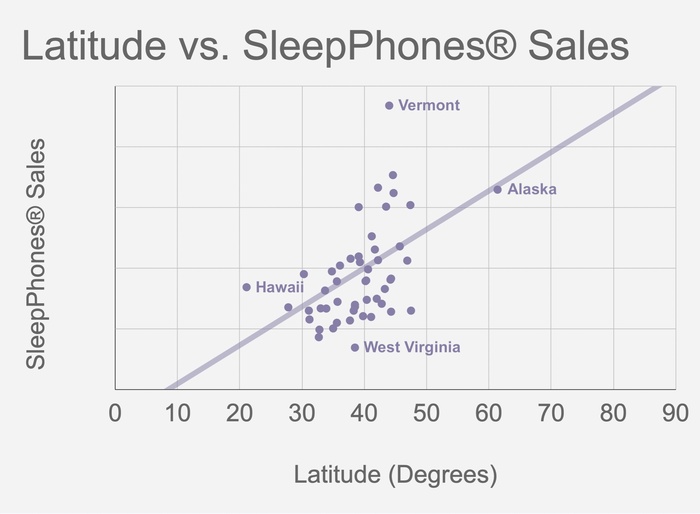Alaska vs. Hawaii: The Sleep Struggle is Real (and Daylight Saving Doesn't Help)

Does Less Winter Sun Mean More Sleepless Nights?
As the days get shorter in the Northern Hemisphere, we find ourselves waking up before the sun is up and coming home after it gets dark. The constant darkness can be depressing for some people. The early sunset is even worse after the daylight savings change. Without much sun to set our daily circadian rhythms, trying to maintain a consistent sleep schedule can be difficult. We wondered if we can prove that less winter sun causes more sleeping issues.
The Surprising Link Between Latitude and Sleep Troubles
We compared the average latitude of each state in the US with our sales per capita. Although the data points may appear messy, there is a clear trend. The higher the latitude, the more SleepPhones® headphones people need. For example, Alaska has a latitude of 61 degrees N, and they rank number 4 out of 50 for the number of SleepPhones® headphones purchased per capita. During the winter solstice, Anchorage, AL gets less than 5.5 hours of sunlight. In contrast, Hawaii is only 21 degrees N, with nearly 11 hours of sun during their shortest day of the year. Hawaii's sunlight is relatively more consistent throughout the year. They rank in the bottom half of the number of SleepPhones® headphones purchased per capita. Even the outliers of Vermont and West Virginia further accentuate the trend.
Remember! Daylight savings ends on Sunday November 3, 2024.
Our data shows poor sleep that requires a sleep aid is linked to low winter sun exposure. When daylight savings "fall back," sleep can worsen. So how can you prepare for the daylight savings change?
- Stay up 30 minutes later on the Friday before. Do the same thing on Saturday night. Daylight savings always changes over after you go to sleep on Saturday and before you wake up Sunday. Making a gradual adjustment is always easier for your body than a drastic change.
- If you have young children, they may need to start the daylight savings adjustment on Thursday night in 15 minute increments. By Monday morning, they will have fully accommodated the hour of difference. Children usually have a more regimented internal sleep-wake cycle than adults. Mess it up at your peril.
- Setting some bedtime routines is very helpful. Your brain learns associations such as brushing your teeth, changing into pajamas, or listening to a relaxing lullaby with sleep. As you practice the routine more consistently, the more your brain is trained to follow up with sleeping. This training can cut both ways though. If you're trained to have insomnia as soon as you get into bed, you will want to completely overhaul any habits that are associated with the insomnia. We might think that we have more self control than Pavlov's dogs, but habit is a powerful force.
- If you drink caffeine, alcohol, smoke, or consume anything else with a psychoactive effect, you wouldn't want to change those habits going into daylight savings. The extra hour already takes adjusting. Changing another variable may make that weekend even more challenging. Our own data shows an association between alcohol and poor sleep.
- For children especially, use light exposure to help them adjust. Bright light upon waking helps to set their brain chemicals for the 24 hour cycle. When winding down for sleep, make sure to use dimmer lights and avoid unfiltered screen time. On most electronic devices, you can set the screen to shift the color balance away from blue towards amber in the evenings. That may reduce the brain activation that blue light causes.
SleepPhones® Headphones: A Natural Solution for Winter Sleep Troubles
Some people turn to sleep aids, such as melatonin or over-the-counter sleeping pills to improve their sleep. We sell a much more natural product. SleepPhones® headphones let you listen to relaxing music in bed, comfortably. We believe that even adults can benefit from lullabies, and millions of our customers agree. Listening to music tells the brain to relax without using any chemicals that often come with side effects. Experience soothing sounds with SleepPhones® headphones and wake up feeling refreshed, ready to embrace the shorter days.
Give your sleep the gift of natural tranquility this winter – try SleepPhones® Headphones today.
Find more about seasonal affective disorder (SAD) here.
